ChatGPT, an artificial intelligence (AI) software, has the potential to revolutionize education by serving as a valuable learning tool. With its ability to generate human-like responses, ChatGPT offers a unique opportunity to enhance the learning experience and promote critical thinking in students. Despite concerns about cheating and academic dishonesty, educators are finding ways to judiciously incorporate ChatGPT into the classroom, leveraging its benefits while addressing the challenges. By setting clear expectations and fostering responsible use, ChatGPT can play a significant role in shaping the future of education.
- ChatGPT has the potential to revolutionize education as a valuable learning tool.
- Integrating ChatGPT into the classroom can promote critical thinking skills in students.
- Clear expectations must be communicated to students to ensure responsible use of ChatGPT.
- Challenges associated with ChatGPT, such as the potential for cheating, should be acknowledged and addressed by educators.
- ChatGPT can enhance the learning experience and prepare students for real-world applications.
Leveraging ChatGPT for Learning
By leveraging the power of ChatGPT, educators can greatly enhance the learning experience for students. ChatGPT, an advanced AI software, offers a range of educational benefits that can help improve learning outcomes. One of the key advantages of incorporating ChatGPT into education is its ability to promote critical thinking.
Using ChatGPT as an educational tool encourages students to think critically about familiar topics. By engaging in conversation with the AI, students are prompted to delve deeper into their understanding and explore different perspectives. This fosters a more interactive learning environment, where students can actively participate and exchange ideas.
In addition to promoting critical thinking, ChatGPT allows educators to create a more personalized learning experience. The AI software adapts to individual students’ needs and preferences, providing tailored assistance and guidance. This flexibility enables educators to cater to diverse learning styles and ensure that every student receives the support they require.
Furthermore, ChatGPT can be used to facilitate real-world preparation. By simulating real-life scenarios and providing practical insights, students can develop valuable skills that are applicable beyond the classroom. Whether it’s in problem-solving, decision-making, or communication, ChatGPT provides a unique opportunity for students to prepare themselves for the challenges they may face in the future.

In summary, incorporating ChatGPT into education can greatly enhance the learning experience for students. The AI software promotes critical thinking, offers personalized assistance, and fosters real-world preparation. However, it is essential for educators to navigate potential challenges, such as the risk of cheating, by setting clear expectations and guidelines. When used responsibly, ChatGPT can revolutionize education by empowering students and facilitating their intellectual growth.
Promoting Critical Thinking with ChatGPT
ChatGPT serves as a valuable learning aid in educational settings, fostering critical thinking and facilitating knowledge acquisition. By incorporating ChatGPT into the classroom, educators can encourage students to think critically about familiar topics and engage in meaningful classroom discussions. This AI-powered tool provides students with the opportunity to explore different perspectives, analyze information, and develop their own opinions.
Using ChatGPT as a learning aid can enhance the educational experience by promoting active participation and in-depth understanding. Students can ask questions, receive detailed responses, and engage in interactive conversations with the AI system. This not only exposes them to a wide range of knowledge but also encourages them to think critically about the information provided.
“ChatGPT has been instrumental in promoting student engagement and critical thinking in my classroom. Through thoughtful discussions with the AI system, my students have developed a deeper understanding of complex concepts and have learned to question and analyze information effectively.”
However, it is essential for educators to be aware of the potential challenges and drawbacks associated with ChatGPT. The tool may pose a risk of academic dishonesty and cheating if not used responsibly. To address this concern, it is crucial to communicate clear expectations to students regarding the appropriate use of ChatGPT for learning purposes. By establishing guidelines and emphasizing academic integrity, educators can ensure that ChatGPT is used ethically and effectively.
The Role of ChatGPT in Knowledge Acquisition
ChatGPT plays a significant role in facilitating knowledge acquisition. Students can access a vast amount of information through this AI-powered tool, enabling them to explore various topics and deepen their understanding. By engaging in conversations with ChatGPT, students are encouraged to ask questions, seek clarification, and expand their knowledge beyond what is covered in traditional classroom resources.
Moreover, ChatGPT can assist students in developing critical thinking skills by challenging them to analyze and evaluate the information they receive. This encourages independent thinking, problem-solving, and the ability to evaluate sources critically. As students learn to navigate and interact with ChatGPT, they develop the skills necessary to assess the reliability and credibility of information, skills that are crucial in our increasingly digital and information-driven world.

In conclusion, ChatGPT serves as a valuable tool in promoting critical thinking and facilitating knowledge acquisition in educational settings. When used responsibly and in alignment with clear expectations, ChatGPT can enhance the learning experience, encourage student engagement, and prepare students for the challenges of the real world.
Incorporating ChatGPT in the Classroom
Educators can harness the potential of ChatGPT by purposefully incorporating it into their classroom strategies, promoting interactive and engaging learning experiences. While there are concerns about cheating and academic dishonesty with tools like ChatGPT, when used responsibly, it can be a valuable asset in education. By utilizing ChatGPT, educators can encourage critical thinking, facilitate knowledge acquisition, and prepare students for real-world challenges.
One way to incorporate ChatGPT into the classroom is to use it as a tool for promoting critical thinking. By asking students to engage with ChatGPT on topics they are already familiar with, educators can encourage them to think deeply and critically about the subject matter. This can lead to meaningful classroom discussions and the development of essential thinking skills.
It is imperative for educators to be aware of the potential challenges associated with ChatGPT, including the potential for cheating. To address this, clear expectations should be communicated to students to ensure responsible use of the tool. By setting guidelines and emphasizing academic integrity, educators can mitigate the risk of misuse and promote ethical use of ChatGPT.
By incorporating ChatGPT into the classroom, educators can create interactive learning experiences. Students can engage in conversations with ChatGPT to deepen their understanding of concepts, ask questions, and receive immediate feedback. This fosters an environment that encourages active participation and personalized learning, ultimately enhancing the overall educational experience.
Table: Pros and Cons of Incorporating ChatGPT into Education
| Pros | Cons |
|---|---|
| Promotes critical thinking | Potential for cheating |
| Enhances classroom discussions | Reliance on technology |
| Engages students in personalized learning | Requires clear guidelines and expectations |
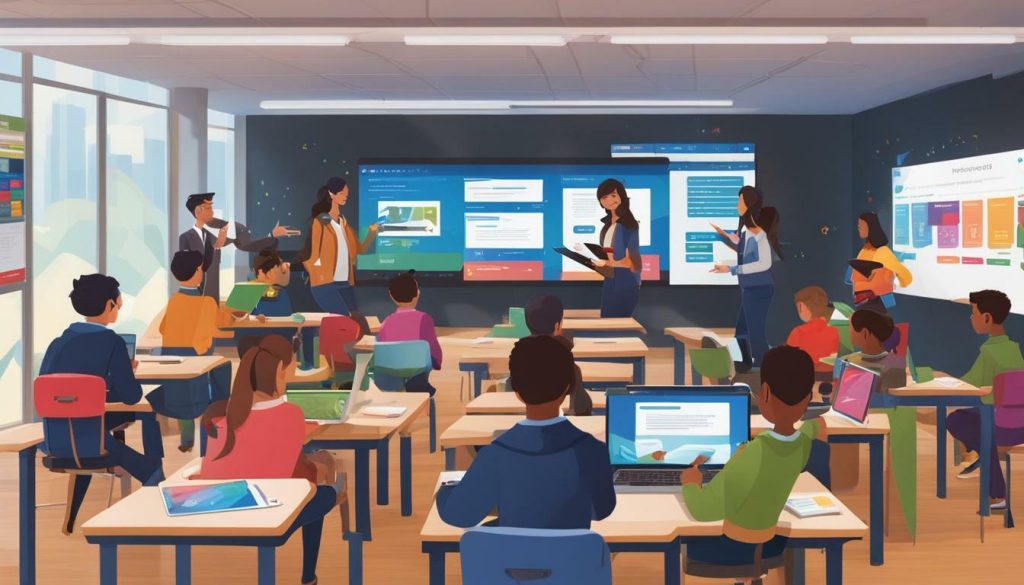
Overall, the incorporation of ChatGPT into the classroom can have a positive impact on the learning experience. It provides opportunities for students to engage in critical thinking, participate in interactive learning, and develop valuable skills for the future. With proper guidance and responsible use, educators can effectively harness the power of ChatGPT to enhance education.
Addressing Concerns and Challenges
While ChatGPT offers tremendous educational potential, educators must be mindful of the challenges it presents, such as the risk of cheating and maintaining academic integrity. As with any technology, there is always the potential for misuse, and it is essential for educators to address these concerns proactively.
One major concern with ChatGPT is the potential for students to use it as a tool for cheating. With its advanced language processing capabilities, there is a risk that students may rely on ChatGPT to generate answers without fully understanding the concepts. This poses a challenge to academic honesty and the integrity of assessments.
Educators can combat this challenge by clearly communicating expectations and guidelines to students. By setting strict boundaries and emphasizing the importance of independent thinking and understanding, educators can ensure that ChatGPT is used as a learning aid rather than a shortcut for academic success.
Academic Honesty with ChatGPT
In addition to cheating concerns, maintaining academic honesty with ChatGPT is crucial. There is a potential risk of plagiarism when students use the AI-generated content without proper citations or attribution. Educators should educate students about the importance of citing sources and provide guidelines on using ChatGPT ethically.
Furthermore, educators must regularly monitor and assess student work to identify potential instances of academic dishonesty. By utilizing plagiarism detection software and closely reviewing assignments, educators can identify any misuse of ChatGPT and take appropriate actions to uphold academic integrity.
Addressing the concerns and challenges associated with ChatGPT is crucial for its responsible use in education. By establishing clear expectations, promoting independent thinking, and actively monitoring student work, educators can harness the potential of ChatGPT as a valuable learning tool while mitigating the risks.

To maximize the educational benefits of ChatGPT, educators should establish and communicate clear expectations for its use within the learning environment. By setting guidelines and communicating them effectively, teachers can ensure responsible and effective utilization of ChatGPT as a learning tool.
One way to communicate expectations is by discussing the intended uses of ChatGPT in the classroom with students. Clearly outlining the specific scenarios and assignments where ChatGPT can be utilized helps students understand the tool’s purpose and its limitations. This can be done through open classroom discussions or by providing written guidelines that explicitly state the dos and don’ts when using ChatGPT.
It is essential to address potential challenges, such as the risk of cheating or relying too heavily on ChatGPT. Educators can communicate the importance of using ChatGPT as an aid rather than a replacement for critical thinking and independent learning. This can be reinforced by emphasizing the need for students to engage in active dialogue, discussions, or additional research to support their responses generated with ChatGPT.
| Guidelines for Using ChatGPT in Education | Examples |
|---|---|
| Use ChatGPT as a tool to enhance learning and promote critical thinking. | Encourage students to evaluate the responses generated by ChatGPT critically. |
| Balance the use of ChatGPT with other learning methods. | Incorporate interactive discussions and independent research alongside ChatGPT-generated responses. |
| Encourage students to refine and expand upon ChatGPT-generated responses. | Guide students to incorporate their own analysis and provide additional examples to support their answers. |
By following these guidelines and establishing clear expectations, educators can harness the benefits of ChatGPT while fostering critical thinking skills and ensuring academic integrity within the learning environment.
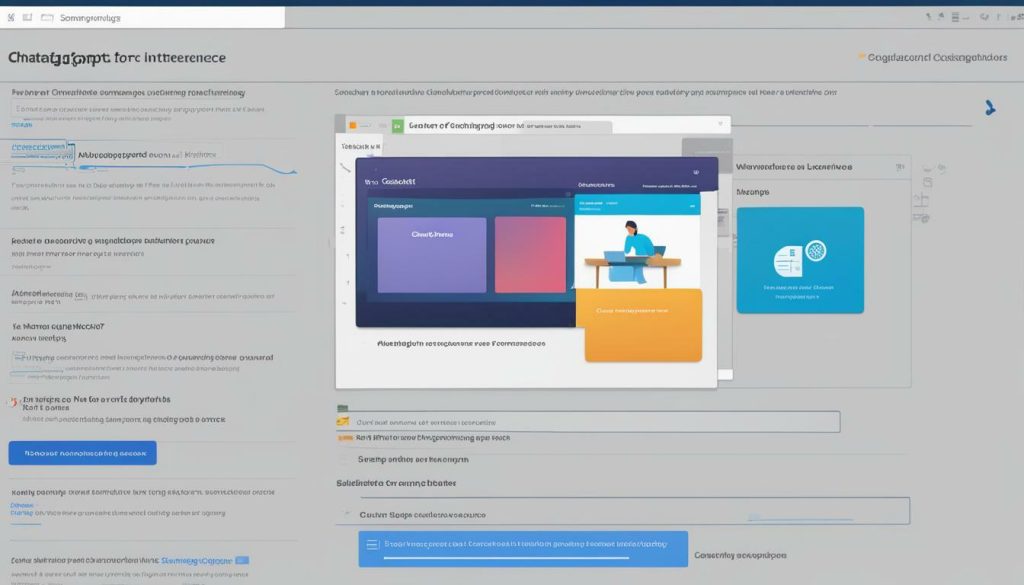
By incorporating ChatGPT into education, educators can better equip students for the challenges and realities of the real world, showcasing its practical applications. ChatGPT offers a unique opportunity to bridge the gap between classroom learning and real-life experiences. Through its conversational nature, students can engage with ChatGPT to develop a range of skills that are essential for success outside of academia.
One key advantage of using ChatGPT is its ability to provide students with exposure to real-world scenarios. By simulating conversations on various topics, ChatGPT sparks critical thinking and problem-solving skills. It encourages students to explore different perspectives and analyze complex issues. In turn, this prepares them to navigate the complexities and uncertainties they will face in their personal and professional lives.
Moreover, ChatGPT offers a valuable platform for students to apply their knowledge in practical contexts. Its interactive nature allows for hands-on learning experiences, where students can test their understanding and receive immediate feedback. This not only enhances their understanding of subject matter but also fosters a sense of self-confidence as they see the real-world applications of their knowledge.

Finally, ChatGPT promotes collaboration and communication skills, which are vital in real-world settings. By engaging in dialogue with ChatGPT, students learn to articulate their thoughts, ask probing questions, and defend their ideas. These skills are transferable to teamwork, negotiations, and presentations – essential competencies for success in various professional contexts.
Overall, incorporating ChatGPT into education enables educators to provide students with a holistic learning experience that prepares them for the real world. By embracing its potential, educators can cultivate critical thinking, problem-solving, and communication skills in students – skills that are indispensable in the ever-evolving modern landscape.
Embracing AI Technology
Embracing AI technology, including ChatGPT, in education opens doors to numerous benefits and unparalleled opportunities for both educators and students. With its advanced natural language processing capabilities, ChatGPT provides a unique learning experience that goes beyond traditional teaching methods. By incorporating AI into the classroom, educators can leverage the power of ChatGPT to enhance student engagement, critical thinking, and knowledge acquisition.
One of the key benefits of using ChatGPT in education is its ability to promote critical thinking. By engaging in interactive conversations with ChatGPT, students are encouraged to question, analyze, and evaluate information in a dynamic learning environment. This fosters the development of critical thinking skills, enabling students to approach complex problems with creativity and logic.
Furthermore, ChatGPT can play a vital role in preparing students for the real world. By simulating real-world scenarios and providing practical applications, ChatGPT equips students with valuable skills that are essential for success beyond the classroom. From improving communication and collaboration to enhancing problem-solving abilities, ChatGPT prepares students for the challenges and opportunities they will encounter in their future careers.
| Benefits of AI in Education |
|---|
| Enhanced student engagement |
| Promotion of critical thinking skills |
| Real-world preparation |
| Improved problem-solving abilities |
However, it is crucial to acknowledge and address the concerns associated with using ChatGPT in education. Ethical considerations, such as academic dishonesty and the potential for cheating, should be carefully managed. To ensure responsible use, educators must communicate clear expectations to students and establish guidelines for the ethical use of ChatGPT as a learning tool.
In conclusion, embracing AI technology, particularly ChatGPT, in education has the potential to revolutionize the learning experience. By leveraging the benefits of AI, educators can create an interactive and engaging learning environment that fosters critical thinking and prepares students for the challenges of the real world. As we navigate the future of education, it is essential to embrace the opportunities AI presents while remaining mindful of ethical considerations.
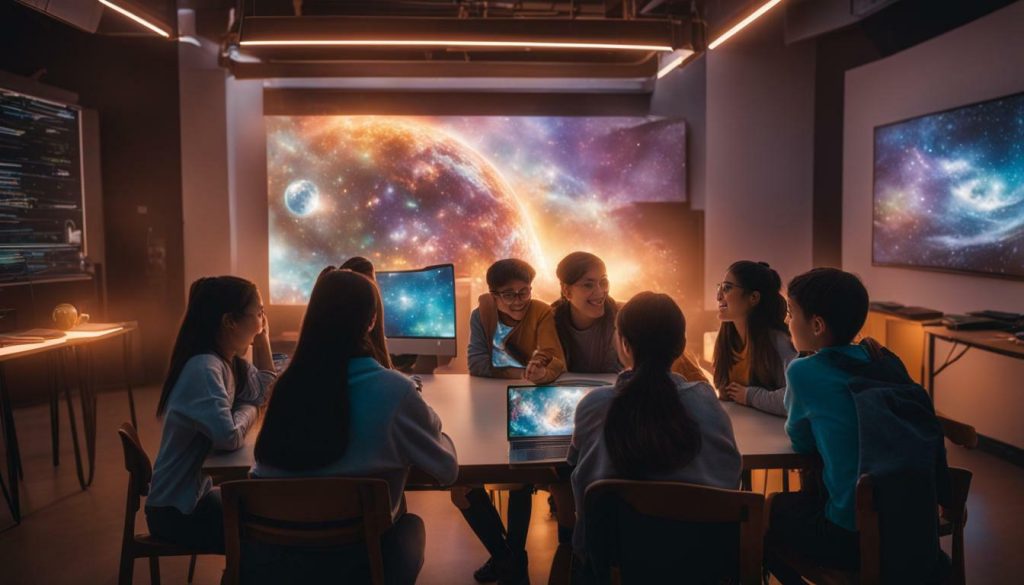
The integration of ChatGPT in education necessitates responsible and ethical decision-making to ensure its positive impact on students’ learning journey. While ChatGPT presents exciting opportunities for enhancing the learning experience, it is crucial for educators to address the ethical considerations associated with its use.
One of the primary concerns surrounding ChatGPT is the potential for cheating and academic dishonesty. As an AI-powered tool, ChatGPT has the ability to generate responses and information quickly and accurately. However, this also means that students may be tempted to misuse it by plagiarizing or relying too heavily on its answers. To combat this, educators must establish clear guidelines and expectations regarding the responsible use of ChatGPT in academic settings.
Transparent communication plays a vital role in ensuring ethical use. Educators should openly discuss the limitations of ChatGPT with students, emphasizing the importance of using it as a learning aid rather than a shortcut. By setting clear boundaries and promoting academic integrity, educators can empower students to use ChatGPT responsibly and in a manner that fosters their own critical thinking and knowledge acquisition.
| Key points to consider for ethical use of ChatGPT in education: |
|---|
| Establish clear guidelines for ChatGPT usage, emphasizing its role as a tool for learning and not a substitute for independent thinking. |
| Encourage open discussions about the benefits and limitations of ChatGPT, addressing concerns about academic dishonesty and cheating. |
| Educate students on the importance of responsible information sourcing and citation methods, even when utilizing ChatGPT. |
| Regularly assess student work to ensure their understanding and application of knowledge, rather than solely relying on ChatGPT-generated answers. |
By promoting responsible and ethical use of ChatGPT, educators can harness its potential as a valuable learning tool. Incorporating ChatGPT into the classroom can encourage critical thinking, facilitate knowledge acquisition, and better prepare students for real-world challenges. With clear expectations and guidelines, educators can help students develop essential skills while effectively navigating the ethical considerations associated with AI technology.
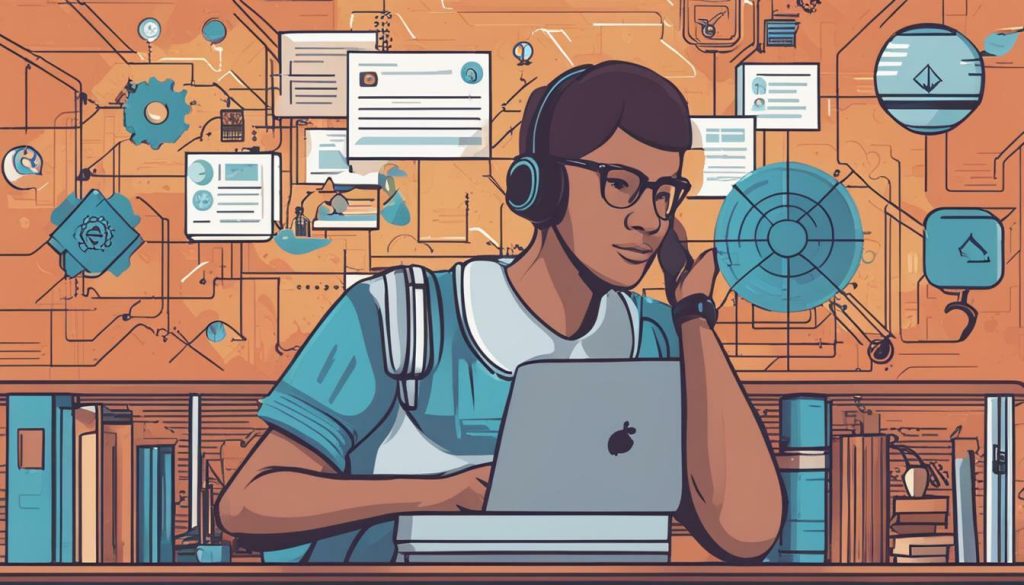
ChatGPT’s presence in education paves the way for exciting possibilities, shaping the future of learning and revolutionizing the educational landscape. As artificial intelligence technology continues to advance, ChatGPT offers educators and students new avenues for interactive and engaging learning experiences. With its ability to provide instant responses, personalized guidance, and vast knowledge resources, ChatGPT is poised to become an indispensable tool in the classrooms of tomorrow.
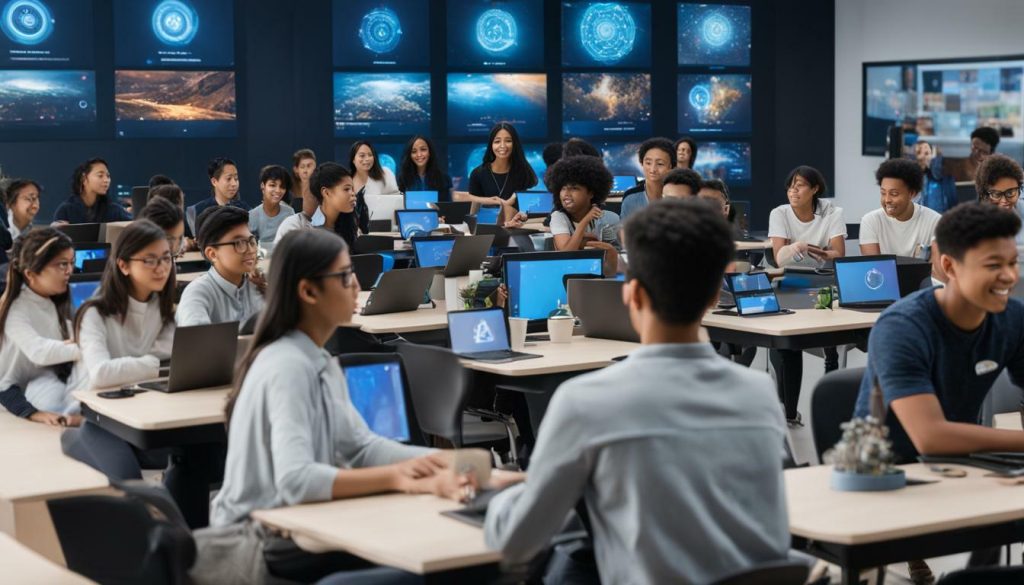
By incorporating ChatGPT into the curriculum, educators can enhance the learning experience by providing students with immediate access to information, enabling them to explore complex subjects in a more interactive and engaging manner. It can also encourage critical thinking as students interact with ChatGPT to delve deeper into topics, ask thought-provoking questions, and challenge their own assumptions.
In addition, ChatGPT’s ability to generate responses in real-time fosters classroom discussions, allowing students to exchange ideas and perspectives. This not only enriches their understanding but also cultivates essential collaboration and communication skills that are valuable in the real world. As students navigate the future of education with ChatGPT, they gain the necessary tools to thrive in an increasingly AI-driven society.
Addressing Concerns and Setting Clear Expectations
While ChatGPT presents immense opportunities for education, it is crucial to address concerns and challenges associated with its use. Educators need to be aware of the potential for cheating and academic dishonesty that arise with access to a wealth of information. By communicating clear expectations and guidelines to students, educators can mitigate these challenges and promote responsible use of ChatGPT. It is essential to foster a culture of academic integrity and ensure students understand when and how to utilize ChatGPT appropriately.
The Ethical Use of ChatGPT in Education
As educators integrate ChatGPT into their teaching practices, they must also navigate the ethical considerations surrounding its use. Responsible use of ChatGPT entails addressing issues such as data privacy, bias detection, and fostering an understanding of AI’s limitations. By embracing these considerations and engaging students in discussions about the ethical implications of AI, educators prepare them to use ChatGPT ethically and responsibly, equipping them with the skills needed to navigate the future of education.
| Benefits of ChatGPT in Education | Challenges and Considerations |
|---|---|
|
|
As the future of education unfolds, ChatGPT’s role in shaping innovative learning experiences cannot be ignored. While challenges exist, the benefits it brings to the table, from enhanced learning outcomes to critical thinking development, outweigh the concerns when used responsibly. By embracing AI technology like ChatGPT, educators can empower students with the skills they need to thrive in a world driven by artificial intelligence.
The Impact of ChatGPT
The incorporation of ChatGPT in education has the potential to greatly impact and enhance learning outcomes, paving the way for a transformative educational experience. While concerns about cheating and academic dishonesty exist, educators can leverage ChatGPT strategically to encourage critical thinking and prepare students for real-world challenges. By incorporating this AI tool into the classroom, educators can create an interactive learning environment that promotes active engagement and fosters the development of essential skills.
One of the key benefits of integrating ChatGPT in education is its ability to promote critical thinking. Students can use ChatGPT to delve deeper into topics they are already familiar with, challenging their existing knowledge and encouraging them to think critically. This tool can facilitate classroom discussions, allowing students to explore different perspectives and develop well-rounded viewpoints. By using ChatGPT as a learning aid, educators can foster an environment where students actively participate in their own learning journey.
Additionally, incorporating ChatGPT into the classroom can help bridge the gap between theoretical learning and real-world application. By engaging with this AI tool, students can develop practical skills that will prepare them for future challenges. ChatGPT can be used to simulate real-world scenarios, enabling students to problem-solve, make informed decisions, and gain valuable hands-on experience. This approach not only enhances learning outcomes but also equips students with the skills required to thrive in the dynamic and evolving job market.
| Benefits of ChatGPT in Education |
|---|
| Enhances critical thinking skills |
| Promotes active engagement and classroom discussion |
| Prepares students for real-world challenges |
| Develops practical skills for future success |
However, educators must also be mindful of the challenges and potential drawbacks associated with ChatGPT. The risk of cheating and academic dishonesty is a concern that needs to be addressed. To address this issue, educators should clearly communicate their expectations regarding the responsible use of ChatGPT and the importance of academic integrity. By setting clear guidelines and expectations, educators can mitigate potential risks and ensure that students use ChatGPT as a valuable learning tool rather than a means to take shortcuts.
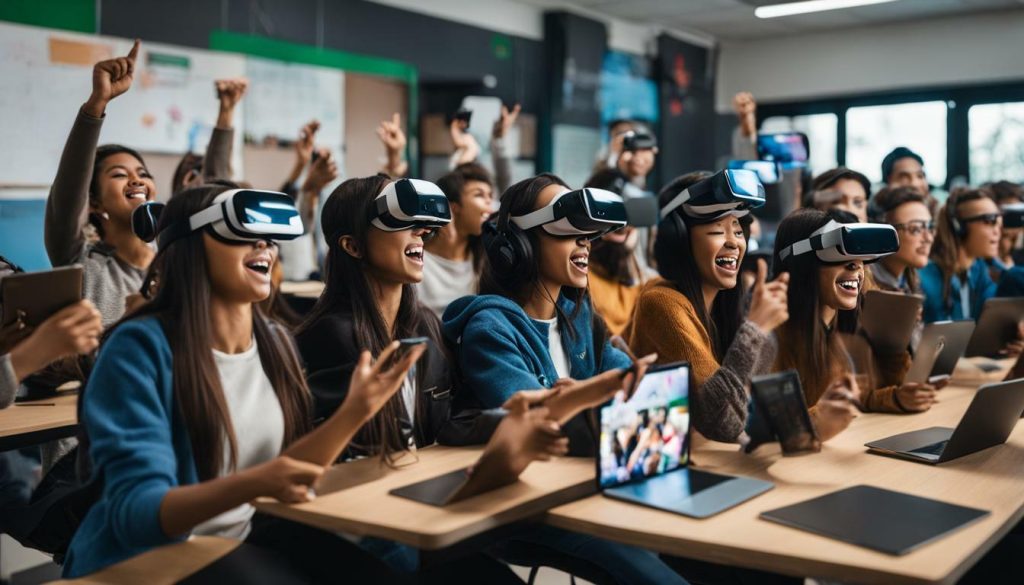
In conclusion, ChatGPT has the potential to revolutionize education by enhancing learning outcomes and fostering critical thinking skills. By incorporating this AI tool strategically, educators can create an engaging and interactive learning environment that prepares students for the challenges of the real world. While cautious implementation and clear communication of expectations are necessary, the benefits of ChatGPT in education far outweigh the challenges. Embracing AI technology like ChatGPT can truly transform the way we educate and empower the next generation.
Conclusion
In conclusion, ChatGPT holds immense potential as a valuable learning tool when integrated responsibly into education, offering a transformative learning experience for students. While concerns about cheating and academic dishonesty exist, ChatGPT can be utilized to encourage critical thinking and prepare students for the real world.
When incorporating ChatGPT into the classroom, educators should carefully consider their course goals and objectives. By leveraging ChatGPT, students can be encouraged to think critically about familiar topics and engage in meaningful classroom discussions.
However, it is essential for educators to be aware of the challenges associated with ChatGPT, such as the potential for cheating. To mitigate these concerns, clear expectations should be communicated to students regarding the responsible use of the tool.
Despite these challenges, the benefits of integrating ChatGPT into education are significant. It can enhance the learning experience, foster critical thinking skills, and help students acquire knowledge in a more interactive and engaging manner. By embracing AI technology like ChatGPT, educators can prepare students for the future and equip them with skills that are relevant beyond the classroom.
FAQ
What is ChatGPT?
ChatGPT is an artificial intelligence (AI) software that can engage in conversation and provide responses based on the input it receives.
How can ChatGPT be useful in education?
ChatGPT has the potential to be a valuable learning tool in education, promoting critical thinking and preparing students for the real world.
What are the benefits of incorporating ChatGPT into the classroom?
By using ChatGPT, educators can enhance the learning experience, encourage critical thinking, and incite classroom discussions.
Are there any concerns associated with ChatGPT in education?
Yes, concerns such as the potential for cheating and academic dishonesty should be considered when using ChatGPT in education.
How can educators address the challenges of using ChatGPT?
Educators can communicate clear expectations to students and ensure responsible use of ChatGPT by establishing guidelines.
Can ChatGPT help students prepare for the real world?
Yes, ChatGPT can assist in real-world preparation by providing practical knowledge and fostering skills valuable beyond the classroom.
Is it important to embrace AI technology like ChatGPT in education?
Yes, embracing AI technology in education, including ChatGPT, can bring significant benefits to the learning process.
What ethical considerations should be taken when using ChatGPT?
The responsible use of ChatGPT involves ethical considerations, and educators should ensure ethical decision-making in its integration.
How does ChatGPT impact education?
ChatGPT has the potential to revolutionize education, significantly influencing learning outcomes and transforming learning experiences.
What does the future hold for ChatGPT in education?
ChatGPT may play a significant role in shaping the future of education, presenting possibilities for transformative learning experiences.

